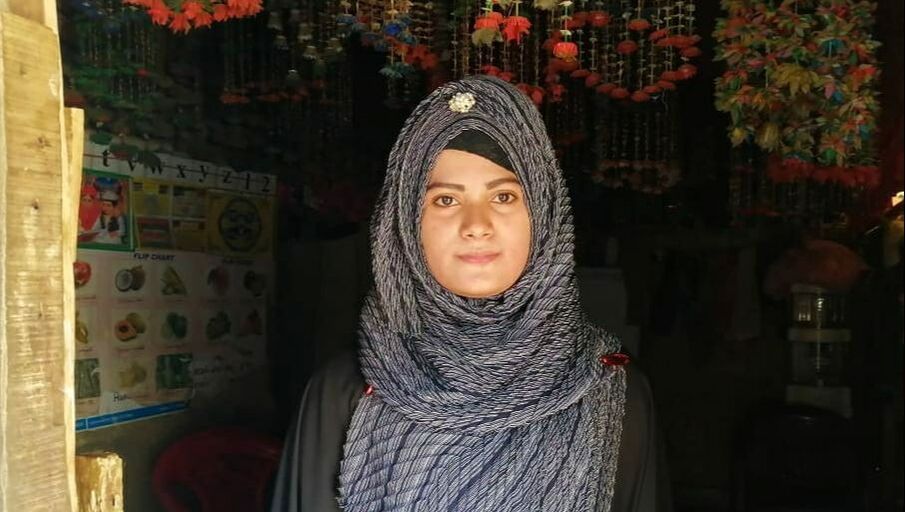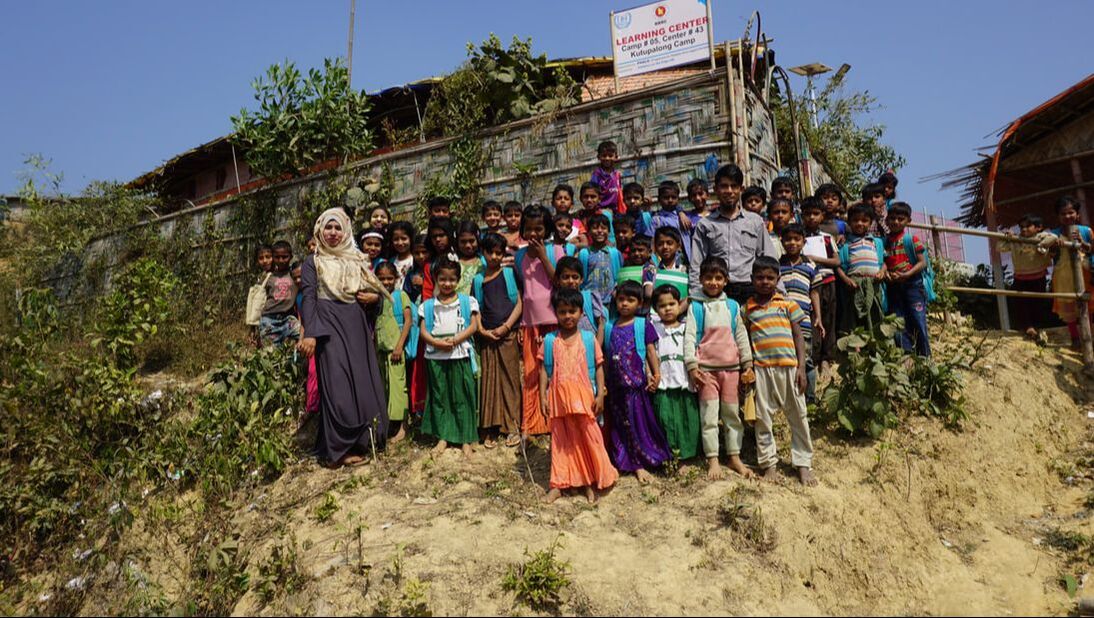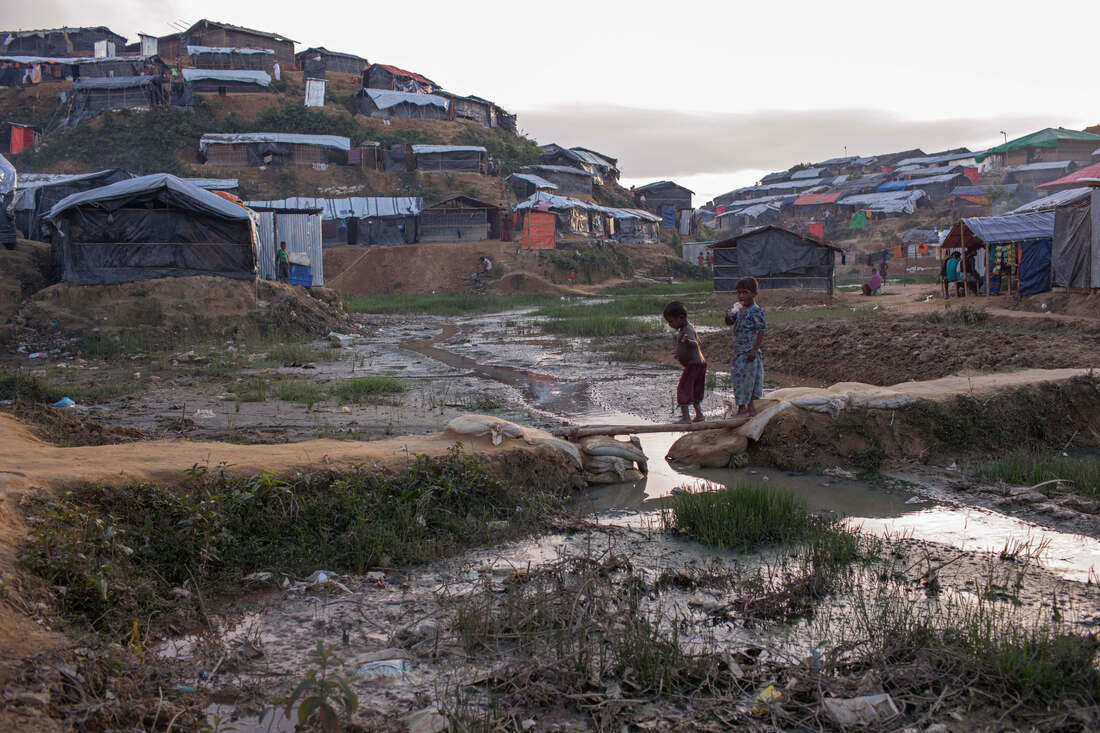MEET RISHMARishma Akter is a Rohingya refugee from Myanmar, who fled to Bangladesh in 2017 with her family. She received training from our partner organisation and now teaches at Learning Centre 22 in Kutupalong refugee camp. She is 18 years old and happily married. She loves teaching, and loves her students and describes one poignant moment in her career... When she first started teaching at the Learning Centre, she noticed one student who seemed like she wanted to talk to her, but was too shy. To help her feel more at ease, Rishma made sure to speak to the child often, asking her questions to help her become more comfortable. It transpired that Rishma looked like her older sister, who died in a fight in Myanmar. One day after class, she ran to Rishma for a hug whilst crying. She explained that Rishma reminded her of her sister. Rishma said this was such a poignant moment; she said it gave her purpose and meaning to her life in the makeshift refugee camp. Rishma said she takes care of the students as if they are her younger brothers and sisters and feels warm when they greet her at the beginning of class. The pandemic has made Rishma anxious and she is uncertain about the future. The Learning Centres we support are currently closed but teachers are offering home-based learning. Rishma says: “The pandemic has put everything into a pause. It feels suffocating sometimes. Every morning I go to home-based learning centers maintaining proper hygiene protocols and meet the children. It has become a routine and seems to be the only good thing now. Except for that, I stay at home all day”. She is thankful to still have her job but is afraid of an uncertain future as a result of the pandemic. She hopes the vaccine will bring an end to it and cannot wait to start teaching at the Learning Centre again. Kutupalong in Bangladesh is the world’s largest refugee camp and home to over 700,000 Rohingya refugees fleeing violence in Myanmar. Children on the Edge have been working here since 2010 and support education for 7,500 refugee children through 75 Learning Centres offering community-led education, play, nutritional support and creative opportunities. Children on the Edge have developed years of experience working with refugee communities, like Rishma’s. We currently support over 12,000 refugee children around the world to realise their rights. We find innovative ways to enable access to education, working alongside refugee communities to find the best possible solutions. We train refugee teachers so that children can learn in their own language or dialect and be with familiar, trusted adults that understand them. Our classrooms are colourful and fun environments, where children are safe and can learn to express themselves. Children can learn, play and discover how to be children again. MORE ABOUT 'THE EDGE' IN BANGLADESHDespite decades of persecution and displacement from Myanmar, the Rohingya have had relatively little attention from the international community. In August 2017, co-ordinated military attacks against them were described by the UN as ‘a textbook example of ethnic cleansing’ and the brutal offensive forced 750,000 Rohingya over the border into Bangladesh. They arrived directly into the border areas where we had been working already for eight years, providing education for Rohingya refugee children. Children make up 50% of the refugee community in Kutupalong camp and, despite a wealth of agencies investing in education, currently 500,000 children still lack access. Children have suffered profound trauma and, with little access to safe, child friendly facilities, they face serious protection risks including child marriage, trafficking and child labour. Without adequate support, children face the prospect of growing up without an education and without the means to process the horrific events they have lived through. WHAT CHILDREN ON THE EDGE ARE DOING TO HELPWith our experience of providing education here since 2010, we were well placed to respond. Together with our partner organisation, Mukti, we constructed 75 Learning Centres in the Kutupalong camp and trained 150 Bangladeshi and Rohingya teachers.
These unique classrooms are developed as colourful havens with vibrant ‘green spaces’ growing outside. 7,500 Rohingya children benefit from daily access to basic education, play, health inputs, nutritional support and creative opportunities. Daily digital lessons are projected onto screens in each classroom, to break down language barriers and enable children to genuinely understand and learn. This technology also gives them the opportunity to experience something of life beyond the confines of the camp. Through ‘Moja Kids’, their own online platform, students create video updates to share back and forth with children outside the camps. This not only gives them a voice and a place to express their talents and creativity, but enables them to interact and tackle their sense of isolation. Throughout the coronavirus pandemic, teachers in Kutupalong have been hosting three batches of home-based classes each day in the camp for five children at a time. 75 teachers have been trained in how to conduct these lessons safely from their own shelters. Support usComments are closed.
|
RECEIVE OUR EMAILSBlog Categories
All
Archives
July 2024
|
|
JOIN US ON SOCIAL MEDIA
|
Annual Report | Contact Us | Jobs | Media Centre | Resources | Shop
Accessibility & Policies: Accessibility | Equity, Diversity & Inclusion Policy | Complaints| Privacy Policy | Safeguarding
Accessibility & Policies: Accessibility | Equity, Diversity & Inclusion Policy | Complaints| Privacy Policy | Safeguarding
Children on the Edge, 5 The Victoria, 25 St Pancras, Chichester, West Sussex, PO19 7LT, UK | 01243 538530 | [email protected]






 Give monthly
Give monthly Fundraise for us
Fundraise for us RSS Feed
RSS Feed
